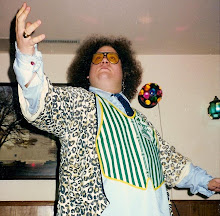Reading roundup
Gang, I made my September recipe Monday night, and it may be my favorite one yet. I'll issue a full report as soon as I can stop eating the leftovers. After that, expect a look at some of the summer's CD releases and a spooky new playlist for the holiday season. In other music news, I recently wrote about Beirut's lovely upcoming album and the second leg of the Heaven and Hell tour. The latter filled a gaping hole in my classic heavy metal education by presenting the Dio-fronted version of Black Sabbath, unprecedented in that their set contained no Ozzy-era songs at all. How cool is that? Ol' Ronnie has rocked for a long, long time, and he may bear a curious resemblance to Aughra these days, but he ain't passing nothing yet. Finally, please keep my Sassy Frassy Lassie in your thoughts and/or prayers - she has some shitty medical shit to deal with this week. Your psychogenic support and goodwill is much appreciated.
So, the last time I got into my reading habits, I was one volume away from finishing two different seven-book fantasy series. Well, I'm done with those books and several others. Let me tell you about the tomes I've enjoyed over the past half year or so.
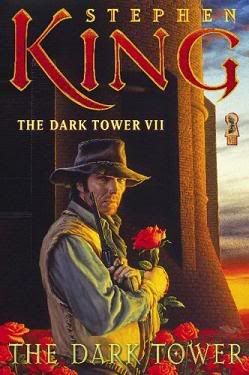 "The Dark Tower VII: The Dark Tower"
"The Dark Tower VII: The Dark Tower"
Stephen King
Donald M. Grant, 2004
When I was 12, I read pretty much nothing but Stephen King and comic books. Not only was I therefore a perfect candidate for Anthrax fandom, I was a completist from an early age. I started reading King's "Dark Tower" series in 1987, after I learned of its existence via the "also by" section in one of his books. I don't remember which one. I got the first two volumes through interlibrary loan and loved them, especially the second one, "The Drawing of the Three," where the story actually begins to gel and move forward. Twenty years later - that's the majority of my life so far, mind you - I came to the end of the path, to the Tower itself, with Roland, the last in a line of mythic gunslingers descended from Arthur the Eld. Whatever happened at the end of these thousands of pages, it was sure to be a disappointment, wasn't it? There was indeed a little disappointment in the ending, but King obviously wants us to walk away with an appreciation for the journey rather than the destination, and I certainly have that here.
Roland's quest was fucking legendary. He crossed through portals of time and space, consulted with oracles, danced and sang, hypnotized and cajoled, lost many a compatriot, killed many an evil soul (as well as - inadvertantly - his own mother), solved the riddles of a demented train, got two fingers chewed off by a mutant lobster creature and literally met his maker. Yes, by the end of the series, King wrote himself into the books, playing the beer-swilling, clueless daddy/god of his characters, whose real-life 1999 injury by minivan actually figures into the otherwise fictional plot. It's clear that the accident prodded him into finishing "The Dark Tower," whether putting the fear of the reaper into him or simply removing writer's block. Although inserting himself into the story leads to a worrisome case of deus ex machina, on the page it's heartfelt, and I suppose I maintain a soft spot for the grizzled scribbler. Still, I wanted all of Roland's spent blood, sweat and tears to amount to something greater than the sort of soft-edged, new agey fate he ultimately meets. The ride is tense, dire and thrilling until the final sentence, however, so don't think I'm slagging the book. I mean, how can one dude end something this long satisfactorily?
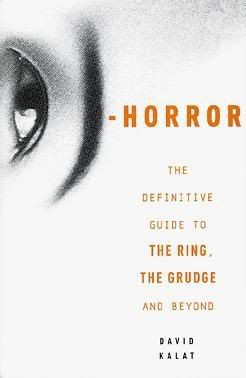 "J-Horror: The Definitive Guide to 'The Ring,' 'The Grudge' and Beyond"
"J-Horror: The Definitive Guide to 'The Ring,' 'The Grudge' and Beyond"
David Kalat
Vertical, 2007
I will admit that modern Japanese horror flicks are mostly a mystery to me. Oh, sure, I've seen most of the ones that are famous over here, the ones in this book's title included, but as a fan of subgenres, I know that the most famous stuff is not always the best. Especially if it's foreign. This book, by a guy from LaGrange Park who runs a reputable DVD reissue label, is precisely what someone like myself needs in order to gain familiarity with a current cinematic movement that has been filtered to him via the gatekeepers of American film commerce. Many of these movies' true themes are not readily apparent to a Western audience, who are so used to living in dysfunctional families and unconventional schedules that the toll these social upheavals take on the Japanese characters is taken for granted. Kalat correctly assumes that his reader is largely ignorant of Japanese cultural symbols and recent Asian history, and his greatest strength as an author is in putting the cavalcade of films he discusses into proper context.
Kalat admits up front that he's more of an old-time horror movie guy, and that J-Horror serves the dual purpose of appealing to more squeamish contemporary filmgoers (precisely, the gaggles of teenage girlfriends whose disposable income has made Japanese horror the global sensation it is) and classic horror buffs who prefer shadows and suggestion over full-fledged nightmare visions. I can appreciate both atmospheric and gore-drenched horror, yet most of the J-Horror I've seen has left me unenthused. In fact, it's typically been the non-ghostie anomalies such as Takashi Miike's harrowing "Audition" or Higuchinsky's eye-popping "Uzumaki" that impressed me most, since many shockers in the tradition of what Kalat calls "dead, wet girls" follow a narcoleptically similar storyline. The difference is in the subtle details, as he points out in chapters dedicated to each of the major players in the movement, describing their signature style and subject matter alongside their major works. He also devotes chapters to how the style appeared contemporaneously across Asian cinema, independent of "Ringu" or other Japanese hits, as well as a fascinating breakdown of how this stuff got distributed in the States. Having already enjoyed Kiyoshi Kurosawa's engrossing "Cure" (another atypical, ghost-free title) due to this book, I have many more movies to go.
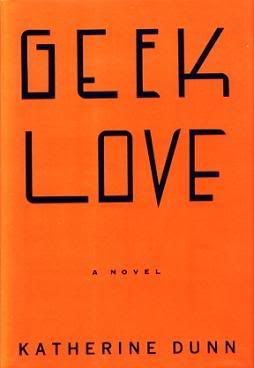 "Geek Love"
"Geek Love"
Katherine Dunn
Alfred A. Knopf, 1989
This one has been on my radar for years. Some time ago, Tim Burton was rumored to be attached to a film version, which is how I first heard about it, and I have received recommendations from a number of folks who claimed I would love it. This summer, I finally got around to the cult classic by Katherine Dunn, an Oregonian who wrote a few novels prior to it but seems to have gone into other types of writing since. "Geek Love" is told from the point of view of Olympia Binewski, a hunchbacked albino dwarf who grew up traveling with her family's carnival. Her parents, inspired by a botanical mutation, conceived their children with the help of genetic experimentation, in hopes that each would be beautifully unique. Among Oly's siblings are Arturo, hairless and bestowed with flippers for limbs, conjoined twins Electra and Iphigenia and little Fortunato, a normal-looking kid with astounding telekinetic powers. Her reminiscences are combined with a modern-day plotline in which she looks after her daughter Miranda without the girl knowing who she really is, becoming desperate when a weird rich lady offers to pay for a surgery that would rid the otherwise comely Miranda of her single physical oddity: a tail.
Dunn's narrator is a literal rosy-eyed sweetheart whose love for her family leads her to ignore their most glaring faults and protect them at all costs. Even as bitter, manipulative Arturo's megalomania reaches a fever pitch, founding a cult in which "normal" folks are moved to chop off their appendages and follow his roaming water show/sermon from town to town until they are no longer physically able, she defends and dotes on the chubby beast. Dunn's language is rich with detail, and in Oly's voice she describes some truly disgusting stuff with such non-judgmental rapture as to make the gross seem golden. In Dunn's veneration of the ostensibly unseemly and sentimental enthusiasm for the abnormal, one can see why Burton was attracted to the tale, and can at times picture the proceedings as one of his goth-pop fantasias, complete with a soundtrack by Stolen Babies. However, while "Geek Love" is often funny, it's ultimately very tragic. I think the book's childlike wonder is what has endeared it to so many readers, but that mean streak gives it more gravity than I anticipated and contributes to its tumultuous emotional grip. It's simply too dark and downbeat to work as a mainstream confection. Any eventual adaptation would be better suited to Terry Gilliam, who has also expressed interest.
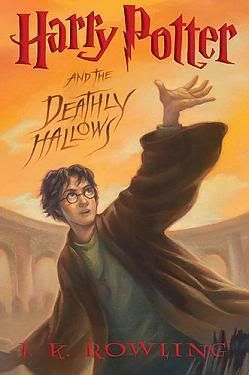 "Harry Potter and the Deathly Hallows"
"Harry Potter and the Deathly Hallows"
J.K. Rowling
Arthur A. Irvine, 2007
Ah, the most popular title on this list. I will assume at this point you have read it or that you don't care that much. If I assume incorrectly, please skip to the next review, because I may let a few blast-ended skrewts out of the box. Myself, I was going to get around to reading it eventually, but I was also pretty concerned about someone blowing it for me before that happened. I luckily have a marvelous girlfriend, who, although not a Potter fan herself (strange, you'd think she would be), thoughtfully snagged me a copy and inscribed it with her sweetly feminine hand. I damn near squealed! At the same time, I dreaded the end of the young wizard's saga, remembering how I felt at the end of "The Dark Tower" some months before. With mixed feelings of anticipation and apprehension, I tried to read it as slowly as I could, to freshly savor Rowling's rich realm of magic and mystery one last time. Such fretting was pointless, though, because "Hallows" may have replaced "Order of the Phoenix" as my favorite volume of the series. Except for a nice, white-knuckled Quidditch match, it has everything the other books have and then some.
It also shares a few similarities with the last "Dark Tower" book, including a scene where a male/female pair of protagonists are attacked by a seemingly innocuous old person in a house located in a deserted village which they discovered after wandering long in despair. A mix of Biblical and Athurian legend inform both tales, Campbell's monomyth principles in full force, and both final books begin in a state of dire upheaval that leaves a number of compatriots dead before our hero confronts his red-eyed nemesis. However, where King simply reminds his readers of the events leading up to the big finale, Rowling integrates everything her characters have learned along the way into her final volume. By revisiting many of the settings and lessons of the other six books, Rowling not only creates a sprawling adventure with the warm feel of familiarity, she actually makes the final showdown more momentous. Harry's entire life has lead to this moment, and the way it all ties together is extremely gratifying. I laughed, I cried, I very nearly cheered. Say what you will about the epilogue (I thought it was fine), but this tale ended exactly as it should have, and Rowling could not have secured her legacy in any more authoritative of a manner.
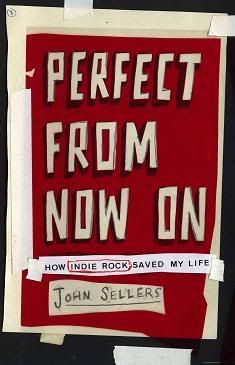 "Perfect from Now On: How Indie Rock Saved My Life"
"Perfect from Now On: How Indie Rock Saved My Life"
John Sellers
Simon & Schuster, 2007
The rock fan memoir is a troublesome sort of book, the sort of thing that will cause most music fans to snort and retort, "I could have written this!" Well, if you have any sort of musical obsession and writing ability, why don't you? Do you assume no one would care? It's a fair assumption. When I tucked into this slim job, my biggest reservation came from being unfamiliar with the author rather than the subject. Who is John Sellers and why should I care about why he likes the music that he does? After all, this is a guy whose main musical loves seem to be Guided By Voices, Pavement, The Smiths, U2, Joy Division and Van Halen. I have varying degrees of appreciation for the place of each of those in the pantheon of rock and actually like a couple of them, but would be lying if I claimed any as a personal favorite, mostly preferring bands that were inspired by those acts over the real thing. He, like many "indie rock" types, chronically confuses commercially-driven '80s hair bands with actual heavy metal, he speaks of R.E.M. in exaltant tones and virulently hates Joanna Newsom. What the blue fuck does this dude know, right? This is the sort of tough argument that keeps many from attempting such a book. Sellers' solution is the best one: ignore it and write from the heart, in the hope that unfiltered candor will be enough of a hook.
While the author and I don't really share favorite bands, we do have a ton of similarities. We both grew up on Midwestern Top 40 radio, sharing common (and commonplace) musical tastes with our peers until the fateful day that one friend showed up with a new look, a new attitude and new, unfamiliar, below-the-radar music in hand. We both delved into subcultures and grew to dislike the safe, generic music our radios continued to spit at us. We thrilled at MTV's old niche programming, read thank you lists in albums, developed mental catalogs of minutiae based on lyrical concerns or placement of songs in an album's track listing. We have both tried to get into bands because we had the hots for some fascinating girl who liked them. We have made overseas pilgrimages to see the towns where our favorite bands formed, seeking further insight to the landscape that formed such powerful music. We are continually drawn to new rock music even as we become jaded, long-in-the-tooth thirtysomethings. We both find Kim Deal curiously but extremely sexy. In the process of reading about Sellers' anxiety over upsetting his favorite musician due to a professional impropriety after being granted unthinkable access to him, I even experienced a very minor variation of this myself. The comparisons go on, but I think it's safe to say that anyone who loves and thinks about music to the extent that Sellers or I do will get a lot out of his book. He may not convince you that The Stone Roses' Second Coming sucks or that Dinosaur Jr. isn't way overrated (he certainly didn't convince me), but you may come to consider your solitary musical journey more universal than it might seem otherwise.
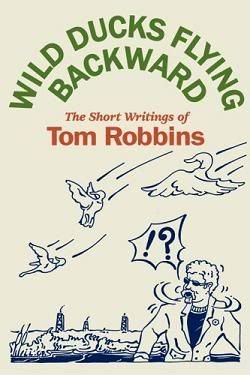 "Wild Ducks Flying Backward"
"Wild Ducks Flying Backward"
Tom Robbins
Bantam, 2005
A few years ago, after thoroughly loving a free copy of "Fierce Invalids Home from Hot Climates," I tore through all of Tom Robbins' seven other novels with an unprecedented fury. His style is his own, combining amusing globetrotting adventures, magical realism, spiritual aspiration, gleeful horniness, individualist rants and informative asides, occasionally in the acknowledged voice of the author. Robbins may be off-putting to those who prefer straightforward tech-thrillers or family dramas, but I've found that others possessed of a particular sort of imagination and intelligence are as addicted to his work as I am. Personally, I cannot think of a book I have ever enjoyed reading more than his 1980 novel "Still Life With Woodpecker." I mean, the process of reading has never felt so invigorating to me; only Mark Danielewski's "House of Leaves" came close in how it resonated throughout my being while consuming it. This is largely due to two factors endemic to all of Robbins' writing, both of which come down to detail. First, his powers of description are unparalled. Each sentence seems crafted with utmost care, every noun, verb, adjective and picturesque metaphor chosen for appropriate impact. Second, he packs his novels with associated tangents, which often leave a stronger impression then his admittedly frothy narratives.
As an unidentified reviewer from Alive is quoted inside the jacket, "Wild Ducks" is "nothing but tangents, minus the novel that usually frames them." It's compiled from magazine pieces, lectures, forewards, poems, responses to various publications' questions and even song lyrics Robbins has amassed over the years. I am ashamed to admit that I didn't know of this book's existence until last weekend, when I was browsing a chain bookstore in a suburban mall. How did I miss it? Whatta chump. Anyhow, I'm almost done with it now, and while it may be more consumable than his novels because of clear demarcations between subjects, it's fair to say it's best appreciated by anyone who's already a fan. No one can convey the romantic logic of taking your sweetie to see the gnat-clouded Okavango delta in Botswana, the effervescent joy of drinking champagne from your lover's footwear, the valor of gallows humor or the simple glory of the tomato-and-mayonnaise sandwich like Robbins. A few of his pieces on modern artists would go completely over my head if he wasn't so skilled a guide. He begins a tribute to Leonard Cohen: "He was rowed down from the north in a leather skiff manned by a crew of trolls. His fur cape was caked with candle wax, his frown stained blue by wine - though the latter was seldom noticed due to the fox mask he wore at all times." The book is bursting with nuggets like that. Since he takes so long to complete his novels, I would love another collection to tide me over in the future - he is still writing new stuff, after all.
So, the last time I got into my reading habits, I was one volume away from finishing two different seven-book fantasy series. Well, I'm done with those books and several others. Let me tell you about the tomes I've enjoyed over the past half year or so.
 "The Dark Tower VII: The Dark Tower"
"The Dark Tower VII: The Dark Tower"Stephen King
Donald M. Grant, 2004
When I was 12, I read pretty much nothing but Stephen King and comic books. Not only was I therefore a perfect candidate for Anthrax fandom, I was a completist from an early age. I started reading King's "Dark Tower" series in 1987, after I learned of its existence via the "also by" section in one of his books. I don't remember which one. I got the first two volumes through interlibrary loan and loved them, especially the second one, "The Drawing of the Three," where the story actually begins to gel and move forward. Twenty years later - that's the majority of my life so far, mind you - I came to the end of the path, to the Tower itself, with Roland, the last in a line of mythic gunslingers descended from Arthur the Eld. Whatever happened at the end of these thousands of pages, it was sure to be a disappointment, wasn't it? There was indeed a little disappointment in the ending, but King obviously wants us to walk away with an appreciation for the journey rather than the destination, and I certainly have that here.
Roland's quest was fucking legendary. He crossed through portals of time and space, consulted with oracles, danced and sang, hypnotized and cajoled, lost many a compatriot, killed many an evil soul (as well as - inadvertantly - his own mother), solved the riddles of a demented train, got two fingers chewed off by a mutant lobster creature and literally met his maker. Yes, by the end of the series, King wrote himself into the books, playing the beer-swilling, clueless daddy/god of his characters, whose real-life 1999 injury by minivan actually figures into the otherwise fictional plot. It's clear that the accident prodded him into finishing "The Dark Tower," whether putting the fear of the reaper into him or simply removing writer's block. Although inserting himself into the story leads to a worrisome case of deus ex machina, on the page it's heartfelt, and I suppose I maintain a soft spot for the grizzled scribbler. Still, I wanted all of Roland's spent blood, sweat and tears to amount to something greater than the sort of soft-edged, new agey fate he ultimately meets. The ride is tense, dire and thrilling until the final sentence, however, so don't think I'm slagging the book. I mean, how can one dude end something this long satisfactorily?
 "J-Horror: The Definitive Guide to 'The Ring,' 'The Grudge' and Beyond"
"J-Horror: The Definitive Guide to 'The Ring,' 'The Grudge' and Beyond"David Kalat
Vertical, 2007
I will admit that modern Japanese horror flicks are mostly a mystery to me. Oh, sure, I've seen most of the ones that are famous over here, the ones in this book's title included, but as a fan of subgenres, I know that the most famous stuff is not always the best. Especially if it's foreign. This book, by a guy from LaGrange Park who runs a reputable DVD reissue label, is precisely what someone like myself needs in order to gain familiarity with a current cinematic movement that has been filtered to him via the gatekeepers of American film commerce. Many of these movies' true themes are not readily apparent to a Western audience, who are so used to living in dysfunctional families and unconventional schedules that the toll these social upheavals take on the Japanese characters is taken for granted. Kalat correctly assumes that his reader is largely ignorant of Japanese cultural symbols and recent Asian history, and his greatest strength as an author is in putting the cavalcade of films he discusses into proper context.
Kalat admits up front that he's more of an old-time horror movie guy, and that J-Horror serves the dual purpose of appealing to more squeamish contemporary filmgoers (precisely, the gaggles of teenage girlfriends whose disposable income has made Japanese horror the global sensation it is) and classic horror buffs who prefer shadows and suggestion over full-fledged nightmare visions. I can appreciate both atmospheric and gore-drenched horror, yet most of the J-Horror I've seen has left me unenthused. In fact, it's typically been the non-ghostie anomalies such as Takashi Miike's harrowing "Audition" or Higuchinsky's eye-popping "Uzumaki" that impressed me most, since many shockers in the tradition of what Kalat calls "dead, wet girls" follow a narcoleptically similar storyline. The difference is in the subtle details, as he points out in chapters dedicated to each of the major players in the movement, describing their signature style and subject matter alongside their major works. He also devotes chapters to how the style appeared contemporaneously across Asian cinema, independent of "Ringu" or other Japanese hits, as well as a fascinating breakdown of how this stuff got distributed in the States. Having already enjoyed Kiyoshi Kurosawa's engrossing "Cure" (another atypical, ghost-free title) due to this book, I have many more movies to go.
 "Geek Love"
"Geek Love"Katherine Dunn
Alfred A. Knopf, 1989
This one has been on my radar for years. Some time ago, Tim Burton was rumored to be attached to a film version, which is how I first heard about it, and I have received recommendations from a number of folks who claimed I would love it. This summer, I finally got around to the cult classic by Katherine Dunn, an Oregonian who wrote a few novels prior to it but seems to have gone into other types of writing since. "Geek Love" is told from the point of view of Olympia Binewski, a hunchbacked albino dwarf who grew up traveling with her family's carnival. Her parents, inspired by a botanical mutation, conceived their children with the help of genetic experimentation, in hopes that each would be beautifully unique. Among Oly's siblings are Arturo, hairless and bestowed with flippers for limbs, conjoined twins Electra and Iphigenia and little Fortunato, a normal-looking kid with astounding telekinetic powers. Her reminiscences are combined with a modern-day plotline in which she looks after her daughter Miranda without the girl knowing who she really is, becoming desperate when a weird rich lady offers to pay for a surgery that would rid the otherwise comely Miranda of her single physical oddity: a tail.
Dunn's narrator is a literal rosy-eyed sweetheart whose love for her family leads her to ignore their most glaring faults and protect them at all costs. Even as bitter, manipulative Arturo's megalomania reaches a fever pitch, founding a cult in which "normal" folks are moved to chop off their appendages and follow his roaming water show/sermon from town to town until they are no longer physically able, she defends and dotes on the chubby beast. Dunn's language is rich with detail, and in Oly's voice she describes some truly disgusting stuff with such non-judgmental rapture as to make the gross seem golden. In Dunn's veneration of the ostensibly unseemly and sentimental enthusiasm for the abnormal, one can see why Burton was attracted to the tale, and can at times picture the proceedings as one of his goth-pop fantasias, complete with a soundtrack by Stolen Babies. However, while "Geek Love" is often funny, it's ultimately very tragic. I think the book's childlike wonder is what has endeared it to so many readers, but that mean streak gives it more gravity than I anticipated and contributes to its tumultuous emotional grip. It's simply too dark and downbeat to work as a mainstream confection. Any eventual adaptation would be better suited to Terry Gilliam, who has also expressed interest.
 "Harry Potter and the Deathly Hallows"
"Harry Potter and the Deathly Hallows"J.K. Rowling
Arthur A. Irvine, 2007
Ah, the most popular title on this list. I will assume at this point you have read it or that you don't care that much. If I assume incorrectly, please skip to the next review, because I may let a few blast-ended skrewts out of the box. Myself, I was going to get around to reading it eventually, but I was also pretty concerned about someone blowing it for me before that happened. I luckily have a marvelous girlfriend, who, although not a Potter fan herself (strange, you'd think she would be), thoughtfully snagged me a copy and inscribed it with her sweetly feminine hand. I damn near squealed! At the same time, I dreaded the end of the young wizard's saga, remembering how I felt at the end of "The Dark Tower" some months before. With mixed feelings of anticipation and apprehension, I tried to read it as slowly as I could, to freshly savor Rowling's rich realm of magic and mystery one last time. Such fretting was pointless, though, because "Hallows" may have replaced "Order of the Phoenix" as my favorite volume of the series. Except for a nice, white-knuckled Quidditch match, it has everything the other books have and then some.
It also shares a few similarities with the last "Dark Tower" book, including a scene where a male/female pair of protagonists are attacked by a seemingly innocuous old person in a house located in a deserted village which they discovered after wandering long in despair. A mix of Biblical and Athurian legend inform both tales, Campbell's monomyth principles in full force, and both final books begin in a state of dire upheaval that leaves a number of compatriots dead before our hero confronts his red-eyed nemesis. However, where King simply reminds his readers of the events leading up to the big finale, Rowling integrates everything her characters have learned along the way into her final volume. By revisiting many of the settings and lessons of the other six books, Rowling not only creates a sprawling adventure with the warm feel of familiarity, she actually makes the final showdown more momentous. Harry's entire life has lead to this moment, and the way it all ties together is extremely gratifying. I laughed, I cried, I very nearly cheered. Say what you will about the epilogue (I thought it was fine), but this tale ended exactly as it should have, and Rowling could not have secured her legacy in any more authoritative of a manner.
 "Perfect from Now On: How Indie Rock Saved My Life"
"Perfect from Now On: How Indie Rock Saved My Life"John Sellers
Simon & Schuster, 2007
The rock fan memoir is a troublesome sort of book, the sort of thing that will cause most music fans to snort and retort, "I could have written this!" Well, if you have any sort of musical obsession and writing ability, why don't you? Do you assume no one would care? It's a fair assumption. When I tucked into this slim job, my biggest reservation came from being unfamiliar with the author rather than the subject. Who is John Sellers and why should I care about why he likes the music that he does? After all, this is a guy whose main musical loves seem to be Guided By Voices, Pavement, The Smiths, U2, Joy Division and Van Halen. I have varying degrees of appreciation for the place of each of those in the pantheon of rock and actually like a couple of them, but would be lying if I claimed any as a personal favorite, mostly preferring bands that were inspired by those acts over the real thing. He, like many "indie rock" types, chronically confuses commercially-driven '80s hair bands with actual heavy metal, he speaks of R.E.M. in exaltant tones and virulently hates Joanna Newsom. What the blue fuck does this dude know, right? This is the sort of tough argument that keeps many from attempting such a book. Sellers' solution is the best one: ignore it and write from the heart, in the hope that unfiltered candor will be enough of a hook.
While the author and I don't really share favorite bands, we do have a ton of similarities. We both grew up on Midwestern Top 40 radio, sharing common (and commonplace) musical tastes with our peers until the fateful day that one friend showed up with a new look, a new attitude and new, unfamiliar, below-the-radar music in hand. We both delved into subcultures and grew to dislike the safe, generic music our radios continued to spit at us. We thrilled at MTV's old niche programming, read thank you lists in albums, developed mental catalogs of minutiae based on lyrical concerns or placement of songs in an album's track listing. We have both tried to get into bands because we had the hots for some fascinating girl who liked them. We have made overseas pilgrimages to see the towns where our favorite bands formed, seeking further insight to the landscape that formed such powerful music. We are continually drawn to new rock music even as we become jaded, long-in-the-tooth thirtysomethings. We both find Kim Deal curiously but extremely sexy. In the process of reading about Sellers' anxiety over upsetting his favorite musician due to a professional impropriety after being granted unthinkable access to him, I even experienced a very minor variation of this myself. The comparisons go on, but I think it's safe to say that anyone who loves and thinks about music to the extent that Sellers or I do will get a lot out of his book. He may not convince you that The Stone Roses' Second Coming sucks or that Dinosaur Jr. isn't way overrated (he certainly didn't convince me), but you may come to consider your solitary musical journey more universal than it might seem otherwise.
 "Wild Ducks Flying Backward"
"Wild Ducks Flying Backward"Tom Robbins
Bantam, 2005
A few years ago, after thoroughly loving a free copy of "Fierce Invalids Home from Hot Climates," I tore through all of Tom Robbins' seven other novels with an unprecedented fury. His style is his own, combining amusing globetrotting adventures, magical realism, spiritual aspiration, gleeful horniness, individualist rants and informative asides, occasionally in the acknowledged voice of the author. Robbins may be off-putting to those who prefer straightforward tech-thrillers or family dramas, but I've found that others possessed of a particular sort of imagination and intelligence are as addicted to his work as I am. Personally, I cannot think of a book I have ever enjoyed reading more than his 1980 novel "Still Life With Woodpecker." I mean, the process of reading has never felt so invigorating to me; only Mark Danielewski's "House of Leaves" came close in how it resonated throughout my being while consuming it. This is largely due to two factors endemic to all of Robbins' writing, both of which come down to detail. First, his powers of description are unparalled. Each sentence seems crafted with utmost care, every noun, verb, adjective and picturesque metaphor chosen for appropriate impact. Second, he packs his novels with associated tangents, which often leave a stronger impression then his admittedly frothy narratives.
As an unidentified reviewer from Alive is quoted inside the jacket, "Wild Ducks" is "nothing but tangents, minus the novel that usually frames them." It's compiled from magazine pieces, lectures, forewards, poems, responses to various publications' questions and even song lyrics Robbins has amassed over the years. I am ashamed to admit that I didn't know of this book's existence until last weekend, when I was browsing a chain bookstore in a suburban mall. How did I miss it? Whatta chump. Anyhow, I'm almost done with it now, and while it may be more consumable than his novels because of clear demarcations between subjects, it's fair to say it's best appreciated by anyone who's already a fan. No one can convey the romantic logic of taking your sweetie to see the gnat-clouded Okavango delta in Botswana, the effervescent joy of drinking champagne from your lover's footwear, the valor of gallows humor or the simple glory of the tomato-and-mayonnaise sandwich like Robbins. A few of his pieces on modern artists would go completely over my head if he wasn't so skilled a guide. He begins a tribute to Leonard Cohen: "He was rowed down from the north in a leather skiff manned by a crew of trolls. His fur cape was caked with candle wax, his frown stained blue by wine - though the latter was seldom noticed due to the fox mask he wore at all times." The book is bursting with nuggets like that. Since he takes so long to complete his novels, I would love another collection to tide me over in the future - he is still writing new stuff, after all.

